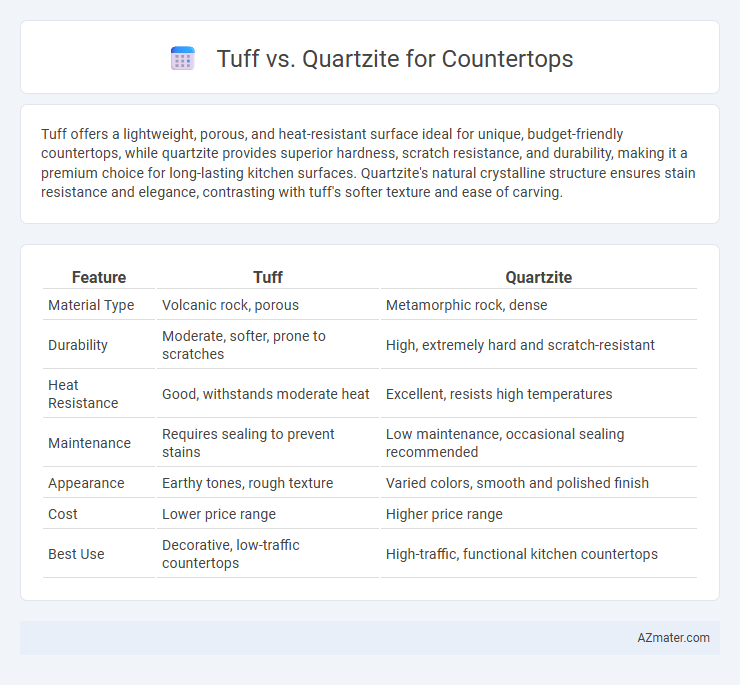Tuff offers a lightweight, porous, and heat-resistant surface ideal for unique, budget-friendly countertops, while quartzite provides superior hardness, scratch resistance, and durability, making it a premium choice for long-lasting kitchen surfaces. Quartzite's natural crystalline structure ensures stain resistance and elegance, contrasting with tuff's softer texture and ease of carving.
Table of Comparison
| Feature | Tuff | Quartzite |
|---|---|---|
| Material Type | Volcanic rock, porous | Metamorphic rock, dense |
| Durability | Moderate, softer, prone to scratches | High, extremely hard and scratch-resistant |
| Heat Resistance | Good, withstands moderate heat | Excellent, resists high temperatures |
| Maintenance | Requires sealing to prevent stains | Low maintenance, occasional sealing recommended |
| Appearance | Earthy tones, rough texture | Varied colors, smooth and polished finish |
| Cost | Lower price range | Higher price range |
| Best Use | Decorative, low-traffic countertops | High-traffic, functional kitchen countertops |
Understanding Tuff and Quartzite: Key Differences
Tuff and quartzite are both natural stones used in countertops, but they differ significantly in composition and durability. Tuff is a soft, porous volcanic rock formed from compacted volcanic ash, making it less dense and more susceptible to scratching and staining. Quartzite is an ultra-hard metamorphic rock originally sandstone, exhibiting high resistance to heat, scratches, and acids, making it a superior choice for kitchen countertops demanding durability and longevity.
Appearance and Color Variations
Tuff countertops exhibit a natural, porous texture with earthy tones ranging from soft beige to warm browns, offering a rustic and organic appearance ideal for naturalistic designs. Quartzite features a denser, crystalline structure with a broad color palette, including whites, grays, greens, and blues, often showcasing dynamic veining and a marble-like elegance. The contrast between Tuff's muted, matte finish and Quartzite's polished, shimmering surface highlights their distinct visual appeal for countertop applications.
Durability and Strength Comparison
Tuff and quartzite differ significantly in durability and strength for countertops, with quartzite offering superior hardness and resistance to scratching due to its high quartz content ranking between 7 and 8 on the Mohs scale. Tuff, a volcanic rock, is softer and more porous, making it less ideal for high-traffic kitchen surfaces prone to wear and potential staining. Quartzite's dense crystalline structure provides exceptional heat resistance and long-lasting durability, positioning it as a premium choice for resilient countertop applications.
Porosity and Stain Resistance
Quartzite countertops exhibit low porosity, typically below 0.1%, making them highly resistant to stains and ideal for kitchen surfaces prone to spills. Tuff, a volcanic rock with higher porosity, absorbs liquids more readily, increasing the risk of staining without proper sealing. Regular sealing is essential for tuff countertops to maintain durability and stain resistance comparable to quartzite.
Maintenance and Cleaning Requirements
Tuff countertops require minimal maintenance due to their porous nature, demanding regular sealing to prevent staining and water absorption. Quartzite offers superior durability and resistance to scratches, with a non-porous surface that simplifies cleaning using mild detergents and prevents bacterial growth. Both materials benefit from avoiding harsh chemicals, but quartzite's hardness typically results in fewer maintenance challenges over time.
Heat and Scratch Resistance
Quartzite countertops exhibit superior heat resistance, withstanding temperatures up to 1,200 degrees Fahrenheit without damage, making them ideal for kitchen use near hot pots and pans. Tuff, while durable, is more prone to scratching and heat damage due to its softer mineral composition compared to the dense, quartz-rich structure of quartzite. Homeowners seeking maximum scratch and heat resistance should prioritize quartzite for its natural hardness and thermal stability, ensuring long-lasting countertop performance.
Cost and Value Analysis
Tuff countertops typically cost between $20 to $50 per square foot, offering an affordable option with moderate durability and distinct volcanic texture. Quartzite ranges from $60 to $100 per square foot, providing high hardness, resistance to heat, and a natural stone appearance that often increases home value. Choosing quartzite delivers long-term value through superior durability and aesthetic appeal despite its higher upfront cost compared to tuff.
Installation Process and Challenges
Tuff countertops require specialized cutting tools due to their soft yet abrasive nature, making installation challenging but manageable with proper equipment. Quartzite is extremely hard and dense, demanding diamond-tipped saws and experienced fabricators to avoid chipping and ensure precise edges. Both materials pose weight-related handling challenges, necessitating reinforced support structures and expert installers to prevent damage during transport and fitting.
Environmental Impact and Sustainability
Quartzite countertops are derived from natural stone, requiring extensive quarrying that can disrupt ecosystems and consume significant energy, yet they are durable and long-lasting, reducing the need for frequent replacement. Tuff, a volcanic rock composed of compacted ash, often involves lower-impact extraction methods and typically requires less processing, resulting in a smaller carbon footprint compared to quartzite. Both materials offer sustainability advantages through longevity, but selecting locally sourced options and considering the mining practices are crucial for minimizing environmental impact.
Which is Better for Your Countertop: Tuff or Quartzite?
Quartzite offers superior durability and scratch resistance compared to tuff, making it an excellent choice for high-traffic kitchen countertops. While tuff provides a unique, softer appearance with moderate heat resistance, it tends to be more porous and susceptible to staining. For long-lasting performance and minimal maintenance, quartzite is better suited as a countertop material.

Infographic: Tuff vs Quartzite for Countertop
 azmater.com
azmater.com